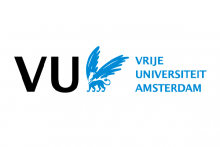
The Department of Earth Sciences of the Faculty of Sciences at Vrije Universiteit Amsterdam (VU) is involved in several studies on carbon cycling and Global Change. Within the Department of Earth Science the Cluster Earth and Climate studies past climate changes, modern climate processes and future perspectives of the Climate System. We combine experimental knowledge of terrestrial, oceanic, atmospheric, and biogeochemical processes with modelling of System Earth. Within the Earth and Climate cluster, the Carbon Cycle group studies the changes and evolution of terrestrial, coastal and ocean environments and its key biogeochemical cycles (N, C) and water. We study the internal dynamics and the response of these systems to natural and anthropogenic forcings.
Since 2002, the Carbon cycle research group has invested in research in carbon emissions from a variety of ecosystems, including peatland, tropical forests and permafrost tundra. The group has been active in setting up the ICOS Integrated Carbon Observing system, one of the first ESFRI infrastructures to become an independent European Research Infrastructure (ICOS-RI). We were also involved in a number of EU funded projects such as GHG-Europe that aimed to determine the full Greenhouse Gas balance of Europe. ICOS and ICOS-INWIRE that aimed to set up a European Infrastructure for GHG monitoring, GEOCARBON a global analysis and monitoring system for carbon, and H2020 project VERIFY preparing for pre-operational monitoring of greenhouse gas emissions. Our group contributes to the development of the Copernicus Atmospheric Monitoring Service (CAMS) on global CH4. Within The Dutch Ruisdael Observatory program we develop tools for quantifying and monitoring the greenhouse gas budget of The Netherlands. Group members participate in ESA funded projects to advance the use of current and future satellite missions to support the quantification of regional greenhouse gas budgets.
VU leads WP8 User engagement, focusing on policy engagement and production of consistent estimates of emissions of CO₂ and CH4.
In WP4 Local and regional modelling and data assimilation VU contributes through high resolution simulation of urban CO2 emissions, and the development of simplified methods to quantify emissions from CO2 imaging satellites. VU also develops inverse modelling tools for the quantification of national scale emissions of carbon dioxide, focusing on The Netherlands, using surface and satellite measurements.
In WP5 Connecting scales and uncertainties, VU develops methods to quantify the uncertainty of inverse modelling derived emissions as well as methods to transfer information and uncertainty between scales.